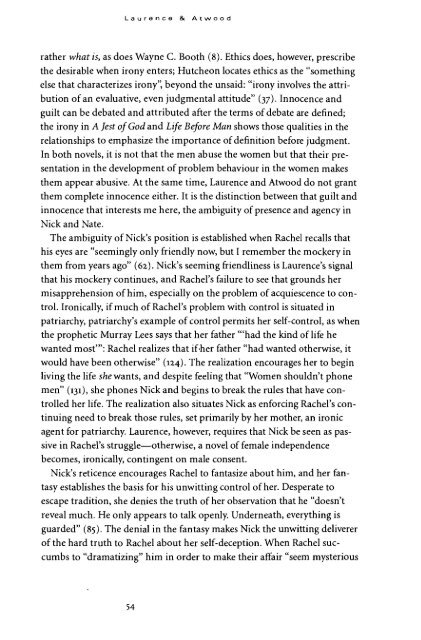A Quarterly of Criticism and Review i^^^^^^^^fcEjfc $15
A Quarterly of Criticism and Review i^^^^^^^^fcEjfc $15
A Quarterly of Criticism and Review i^^^^^^^^fcEjfc $15
Create successful ePaper yourself
Turn your PDF publications into a flip-book with our unique Google optimized e-Paper software.
Laurence & A t w o o drather what is, as does Wayne C. Booth (8). Ethics does, however, prescribethe desirable when irony enters; Hutcheon locates ethics as the "somethingelse that characterizes irony", beyond the unsaid: "irony involves the attribution<strong>of</strong> an evaluative, even judgmental attitude" (37). Innocence <strong>and</strong>guilt can be debated <strong>and</strong> attributed after the terms <strong>of</strong> debate are defined;the irony in A Jest <strong>of</strong> God <strong>and</strong> Life Before Man shows those qualities in therelationships to emphasize the importance <strong>of</strong> definition before judgment.In both novels, it is not that the men abuse the women but that their presentationin the development <strong>of</strong> problem behaviour in the women makesthem appear abusive. At the same time, Laurence <strong>and</strong> Atwood do not grantthem complete innocence either. It is the distinction between that guilt <strong>and</strong>innocence that interests me here, the ambiguity <strong>of</strong> presence <strong>and</strong> agency inNick <strong>and</strong> Nate.The ambiguity <strong>of</strong> Nick's position is established when Rachel recalls thathis eyes are "seemingly only friendly now, but I remember the mockery inthem from years ago" (62). Nick's seeming friendliness is Laurence's signalthat his mockery continues, <strong>and</strong> Rachel's failure to see that grounds hermisapprehension <strong>of</strong> him, especially on the problem <strong>of</strong> acquiescence to control.Ironically, if much <strong>of</strong> Rachel's problem with control is situated inpatriarchy, patriarchy's example <strong>of</strong> control permits her self-control, as whenthe prophetic Murray Lees says that her father '"had the kind <strong>of</strong> life hewanted most'": Rachel realizes that if'her father "had wanted otherwise, itwould have been otherwise" (124). The realization encourages her to beginliving the life she wants, <strong>and</strong> despite feeling that "Women shouldn't phonemen" (131), she phones Nick <strong>and</strong> begins to break the rules that have controlledher life. The realization also situates Nick as enforcing Rachel's continuingneed to break those rules, set primarily by her mother, an ironicagent for patriarchy. Laurence, however, requires that Nick be seen as passivein Rachel's struggle—otherwise, a novel <strong>of</strong> female independencebecomes, ironically, contingent on male consent.Nick's reticence encourages Rachel to fantasize about him, <strong>and</strong> her fantasyestablishes the basis for his unwitting control <strong>of</strong> her. Desperate toescape tradition, she denies the truth <strong>of</strong> her observation that he "doesn'treveal much. He only appears to talk openly. Underneath, everything isguarded" (85). The denial in the fantasy makes Nick the unwitting deliverer<strong>of</strong> the hard truth to Rachel about her self-deception. When Rachel succumbsto "dramatizing" him in order to make their affair "seem mysterious54
















